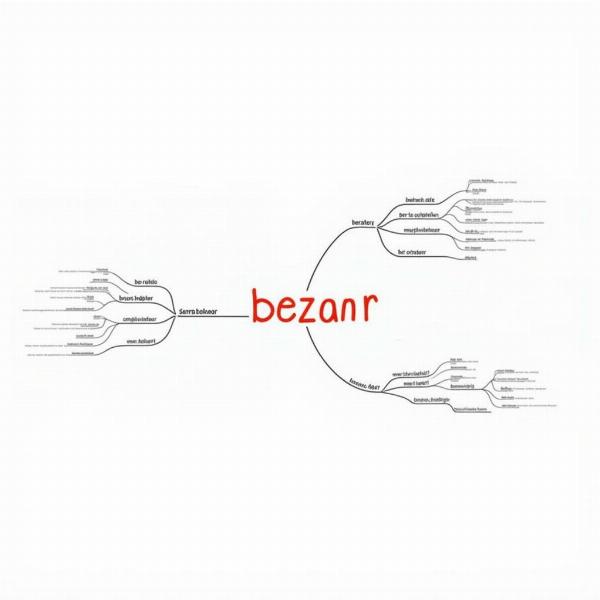Understanding the nuances of Hindi words like “bezaar” is crucial for anyone seeking to truly grasp the language and culture. “Bezaar” encapsulates feelings of annoyance, boredom, and displeasure. Whether you’re learning Hindi, traveling in India, or simply curious about the language, understanding the various meanings and contexts of “bezaar” will enrich your communication and cultural understanding. This article explores the various meanings of “bezaar” in Hindi, its usage in different contexts, and its cultural significance.
Delving into the Meaning of Bezaar
“Bezaar” (बेज़ार) primarily signifies a state of being fed up, annoyed, or weary. It can describe a feeling of boredom stemming from monotony or a sense of irritation towards someone or something. Think of it as the feeling you get when you’ve been stuck in traffic for hours or when someone keeps repeating the same joke. The word carries a sense of weariness and discontent, implying a desire to escape the current situation.
Bezaar: More than Just Annoyance
While “bezaar” is often translated simply as “annoyed” or “bored,” its meaning is richer and more layered. It can also convey a sense of disgust, aversion, or even mild anger. The specific meaning depends heavily on the context and the tone of voice used. For example, saying “Mai tumse bezaar hoon” (मैं तुमसे बेज़ार हूँ) can range from “I’m annoyed with you” to “I’m fed up with you” depending on the situation.
Bezaar in Everyday Conversations
“Bezaar” is a common word in everyday Hindi conversations. You’ll often hear it used in informal settings among friends and family. Here are some examples of how “bezaar” is used in different contexts:
- Expressing boredom: “Mai is film se bezaar ho gaya hoon” (मैं इस फिल्म से बेज़ार हो गया हूँ) – I’m bored with this movie.
- Showing annoyance: “Uski baaton se main bezaar ho gaya” (उसकी बातों से मैं बेज़ार हो गया) – I’m annoyed by his/her talk.
- Conveying frustration: “Is kaam se main bezaar ho chuka hoon” (इस काम से मैं बेज़ार हो चुका हूँ) – I’m fed up with this work.
Using Bezaar with Different Intensities
The intensity of “bezaar” can be amplified or softened by using adverbs and other modifiers. For instance, “bahut bezaar” (बहुत बेज़ार) means “very annoyed” or “extremely bored,” while “thoda bezaar” (थोड़ा बेज़ार) signifies a milder feeling of annoyance or boredom.
Cultural Nuances of Bezaar
Understanding the cultural context of “bezaar” is essential for effective communication in Hindi. In Indian culture, expressing strong emotions directly is often considered impolite. Therefore, “bezaar” can be used as a relatively subtle way of conveying displeasure without being overtly confrontational.
Is “Bezaar” Always Negative?
While primarily negative, “bezaar” can sometimes be used in a lighter, more playful way, especially among close friends. In such cases, it might convey a sense of teasing or mock annoyance rather than genuine displeasure.
Bezaar: Synonyms and Related Words
Several Hindi words express similar sentiments to “bezaar,” each with its own nuances. These include “ukhta hua” (उकता हुआ) for bored, “pareshan” (परेशान) for troubled, and “dukhit” (दुखित) for saddened. Understanding the subtle differences between these words can help you choose the most appropriate term for a given situation.
 Visual Representation of Bezaar Synonyms
Visual Representation of Bezaar Synonyms
Conclusion: Mastering the Nuances of Bezaar
“Bezaar” is more than just a simple word for annoyance or boredom in Hindi. It represents a complex emotion that encompasses weariness, discontent, and even mild anger. Understanding its various meanings, contextual usage, and cultural significance can greatly enhance your understanding of the Hindi language and Indian culture. By mastering the nuances of “bezaar,” you can communicate more effectively and build stronger connections with Hindi speakers.
FAQ: Common Questions about Bezaar
- What is the literal meaning of “bezaar”? The literal meaning of “bezaar” is without zest or interest.
- Can “bezaar” be used in formal settings? While more common in informal conversations, “bezaar” can be used in formal settings with caution, ensuring the tone is respectful.
- What is the difference between “bezaar” and “pareshan”? While both express displeasure, “bezaar” leans towards boredom and annoyance, while “pareshan” focuses on trouble and worry.
- How do I respond to someone who says they are “bezaar”? Acknowledge their feelings and offer support or a change of scenery.
- Is there a positive equivalent to “bezaar”? Not directly, but words like “utsaahit” (excited) or “khush” (happy) express the opposite emotion.
- Can “bezaar” be used to describe inanimate objects? Generally, “bezaar” is used to describe the feelings of a person, not an object.
- What are some other ways to express boredom in Hindi? Other words include “ukhta hua” (bored), “nirutsaah” (unenthusiastic), and “tanaavgrast” (stressed).
Connect with Meaning-Hindi.in for Expert Hindi Translations
Meaning-Hindi.in is your trusted partner for accurate and culturally sensitive Hindi translation services. We specialize in a wide range of translation needs, from business and legal documents to website localization and educational materials. Our expert linguists ensure that your message is conveyed accurately and effectively in Hindi, respecting the nuances of the language and culture. Contact us today for all your Hindi translation requirements. Email: [email protected], Phone: +91 11-4502-7584. Meaning-Hindi.in understands the complexities of the Hindi language and can help you bridge the communication gap.